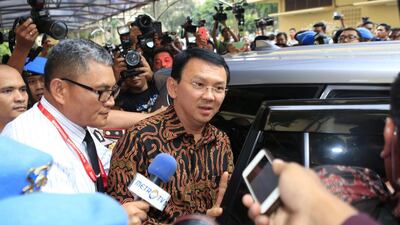JAKARTA // After 17 years of democratic rule, it is now dawning on Indonesian leaders that there is a disturbing dichotomy between conservative religious interpretations of the Quran and the country’s laws, most notably the 1945 Constitution which lays the foundation of the secular state.
The world’s most populous Muslim nation has always held itself up as an example of how Islam and democracy can coexist, but complicating it all is that even mainstream Indonesian Muslims do not necessarily go along with the separation of mosque and state.
When Jakarta governor Basuki Tjahaja Purnama told voters last month they should not allow themselves to be fooled by the common interpretation of a Quranic verse instructing them not to vote for non-Muslim leaders, he gave extremists the opportunity they were looking for.
As an ethnic Chinese Christian who, in fact, has attended Islamic schools and whose father has financed the building of mosques in his native Sumatra, he is now facing a possible charge of blasphemy which could kill his chances of seeking a second term in next February’s gubernatorial election.
He should have known better, but a careless mistake does not explain the strength of the outcry, which brought together not only the violent Islamic Defenders Front and other radical groups, but also powerful political interests determined to put an end to Mr Purnama’s political career.
Already in question, Indonesia’s reputation for tolerance took another blow on Friday when tens of thousands of largely peaceful demonstrators took to the streets of Jakarta and several other Indonesian cities to demand Mr Purnama’s prosecution.
Human rights groups are now calling for a review of the country’s 1965 Blasphemy Law, which they say is at odds with a constitution that guarantees freedom of religion.
Activists are also seeking stricter enforcement of an article in the criminal code, prescribing five years’ imprisonment for those found guilty of displaying hostility, hatred or contempt towards any group of people — in this case non-Muslims.
Backed by ex-president Megawati Sukarnoputri’s Indonesian Democratic Party for Struggle, Mr Purnama still tops the polls ahead of former education minister Anies Baswedan and Agus Yudhoyono, the elder son of former president Susilo Bambang Yudhoyono.
Both his rivals were last-minute entrants in the field, with Mr Baswedan the choice of the Sharia-based Justice and Prosperity Party and former presidential candidate Prabowo Subianto’s Great Indonesia Movement Party (Gerindra).
Agus Yudhoyono was plucked from a promising military career to represent his father’s Democrat Party in what appears to be an effort to create a political dynasty — whether he wins the governorship or not.
Hardliners have chafed over having a non Muslim in charge of the Indonesian capital ever since Mr Purnama was elevated from the vice-governor position when incumbent governor Joko Widodo became president in 2014.
Despite his penchant for outspokenness, the governor has been hugely effective in solving some of the city’s problems and his transparent approach to the job has stood in stark contrast to the old-style political hacks who have gone before him.
But in a country where Muslims constitute an 88 per cent majority, it remains to be seen whether voters will pay attention to the current backlash.
In 2012, Mr Widodo and Mr Purnama won by a landslide, in what was seen as a demonstration of the electorate’s displeasure over primordial efforts to disqualify them.
Only 11-13 per cent of Indonesians have voted for Sharia-based parties in the four national elections held since the country embarked on the road to democracy in 1998 following the downfall of authoritarian leader President Suharto.
But it will take many more years, if ever, before a non-Muslim becomes president of Indonesia. Similarly, Christian officers can never look forward to becoming head of the armed forces or the national police, no matter how competent they are.
Mr Widodo has accused political parties of fomenting the current unrest, but critics are worried he is following the lead of President Yudhoyono, who was widely criticised for allowing extremists to seize the momentum during his decade-long rule.
Mr Purnama has apologised over his October 5 remark, but that has done little to placate the Indonesian Ulama Council, a non-government body notorious for issuing conservative edicts against secularism, pluralism and liberalism.
In determining that Mr Purnama had committed blasphemy, the council held that Al Maidah 51 — the Quranic verse he quoted — does explicitly forbid non-Muslims from becoming leaders.
With the Jakarta governor now undergoing police questioning over the blasphemy allegations, it is difficult to believe that radicals will accept anything but his removal from the gubernatorial race, otherwise the current unrest will continue.
Jakarta’s Chinese community has already been spooked by an outbreak of violence in the city’s northern suburbs, where most of them are concentrated, on the evening of Friday’s rally.
Memories are still fresh of the orgy of rape and bloodshed inflicted on the community in the riots that led to Suharto’s resignation. The Chinese were specifically targeted because of the disproportionate hold they have on the Indonesian economy.
Police say they will decide in a two weeks whether Mr Purnama is to be charged, but their cautious approach may have something to do with national police chief Gen Tito Karnavian being a former head of the Detachment 88 counter-terrorism unit, responsible for jailing hundreds of militants since it was formed in the aftermath of the devastating 2002 Bali bombing.
He and other counter-terrorism officials have often criticised the fact that not enough has been done to prevent the sort of inflammatory rhetoric from extremist clerics which serves as the ideological underpinnings of terrorist and other violent actions.
foreign.desk@thenational.ae

